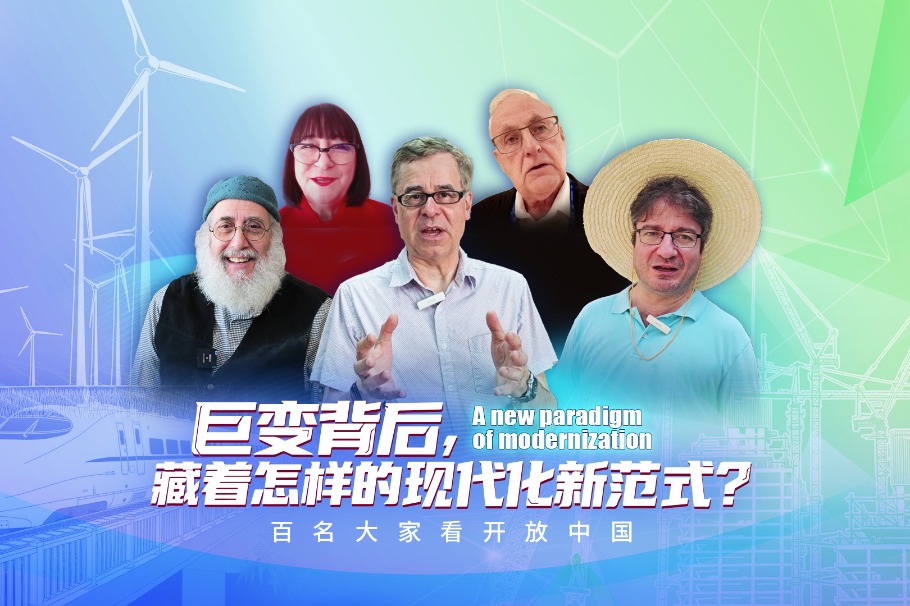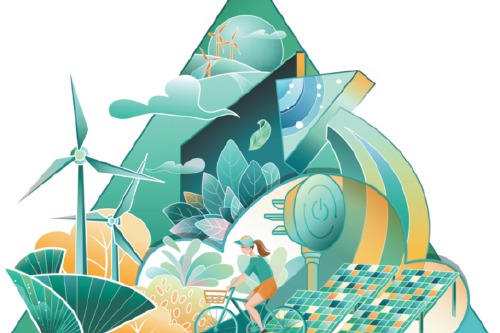Unfair advantage


Introduction of carbon border taxes by developed countries will be a further evasion of their climate obligations
Since the global efforts to reduce greenhouse gas emissions were initiated in the 1990s, voices calling for carbon tariffs have been heard in developed countries, particularly inside the European Union. However, due to opposition from the mainstream political parties, carbon tariffs were not put in place until March this year when the European Commission approved the WTO-compatible EU Carbon Border Adjustment Mechanism. This marks a major shift in the EU.This mechanism is to be phased in gradually from Jan 1, 2023.
The introduction of carbon tariffs might just be a beginning of the adjustment in global climate governance. More profound changes are expected in the coming years, which will potentially affect the principles and rules in global climate governance and bring more difficulties to the emissions reduction endeavors of emerging and developing countries.
The global emissions reduction campaign, which started in the 1990s, coincided with the explosive development of globalization. The carbon reduction actions of developed countries overlapped with the exodus of their manufacturing industries. The pressure to cut emissions accelerated the relocating of carbon-intensive production from developed countries to developing countries, while the industries not transferred became less competitive due to higher emissions costs.
During the Trump administration, some Republicans called for the introduction of carbon tariffs based on the so-called fair trade principle. In March, the Office of the United States Trade Representative said it would consider carbon border taxes. With many of the 27 EU members having proposed to introduce carbon tariffs, the US' putting carbon border taxes on its agenda means that it could become a prevailing choice for the developed world.
Once carbon tariffs are implemented in the EU and the US, they will greatly impact the global emissions reduction framework and mechanism. For example, the carbon border taxes target products which the EU view as failing to meet its emissions standards, or from countries with less ambitious emissions reduction plans. It makes the carbon tariffs a unilateral tool.
As a result, developing countries will face a more challenging political environment. Since its inception, the global response to climate change has been advocating protection of the interests and rights of developing countries. This has never been put into practice however. The imposition of carbon border taxes will be a further infringement on the rights and interests of developing countries. According to the United Nations Framework Convention on Climate Change, parties should uphold the principle of common but differentiated responsibilities and voluntarily contribute to global climate change mitigation efforts. Developed and developing countries should shoulder the responsibilities corresponding to their historical accumulative emissions as well as current conditions. The Kyoto Protocol and Paris Agreement were signed based on these principles. Therefore, developed countries should not require developing countries to realize the same emissions reduction targets as a premise for their efforts.
The legitimate rights and interests of developing countries in climate issues have long been neglected. Developed nations, who are still failing to meet their emissions reduction targets, have also failed to fulfill their promises to help developing countries cut their emissions. So far, major developed countries, including the US, members of the EU and Japan, have all put forward their blueprints for reducing their carbon emissions. They need to counteract the rising domestic pressure to cut emissions by requiring developing countries to ramp up their emissions reduction efforts, which is evidenced by the introduction of carbon tariffs.
If implemented, the carbon tariffs levied by the EU will have direct impacts on China's foreign trade and emissions reduction efforts. Currently, China is pushing forward the transformation of its energy structure, with its energy intensity in steady decline, and the fast growth of carbon dioxide emissions arrested. However, the country is still the largest carbon emitter in the world, with its energy consumption per unit of GDP higher than the world average. In 2020, China became the largest trading partner of the EU, exporting 383.5 billion euros ($452.7 billion) worth of goods to the bloc. The carbon tariffs will drive up the costs for China's manufacturers, and erode their global competitiveness.
According to the estimates of Goldman Sachs, if the carbon border tax is set at $100 per metric ton, China will have to pay an additional $35 billion a year for goods exported to the EU, accounting for about 7.5 percent of its total exports to the EU. If Chinese enterprises purchase carbon emissions quotas under the EU's Emissions Trading System, they will pay extra charges due to the big differences between the carbon prices of China and the EU.
As the largest emitter in the world, China shoulders a heavy responsibility for carbon emissions reduction. The country has pledged to peak its carbon emissions before 2030 and achieve carbon neutrality before 2060. For a developing country that is still experiencing fast growth, China faces a more daunting task than most developed economies. In the coming four decades, China will witness a sharp decline in carbon emissions, which will test the resilience and dynamism of the Chinese economy as the country aims to achieve its development targets and keep improving its global competitiveness amid a more stringent environment.
Developed countries, after years of adjustment, have formed low-emitting economic structures, and should assume bigger emissions reduction responsibilities. By introducing carbon border taxes, developed countries are leveraging their market advantages to alter the global climate governance framework and evade their due responsibilities, which is an infringement on the rights and interests of developing countries. In the new round of global climate negotiations, developing countries should safeguard their legitimate rights and interests while jointly fighting climate change.
The author is a researcher at the China Institutes of Contemporary International Relations. The author contributed this article to China Watch, a think tank powered by China Daily.
The views do not necessarily reflect those of China Daily.



































